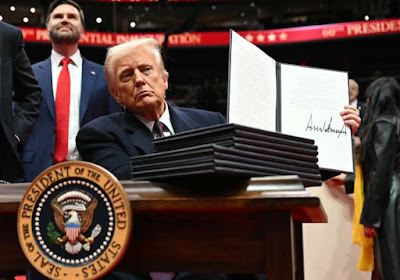 |
| And what rough beast, its hour come round at last, Slouches towards Bethlehem to be born? W.B. Yeats, The Second Coming, 1921 |
ALL OVER THE WORLD, devout Christians will be reaching for their bibles, reading and re-reading Revelation 13:16-17. For the benefit of all you non-Christians out there, these are the verses describing the economic power of the beast.
“And he causes all, both small and great, rich and poor, free and slave, to be marked on the right hand or the forehead, and that no one can buy or sell unless he has the mark, the name of the beast, or the number of his name.”
Okay, okay, 47 is not 666, and the ergot-induced visions of a First Century hermit, living in a cave on the Greek island of Patmos, are hardly the most reliable guide to what is happening in the Year of Our Lord 2025. But, you have to admit, the spectacle of Donald Trump commanding the whole earth (including the penguins of Australia’s Heard and McDonalds Islands) to bend the knee to his universal tariffs, is pretty evocative of what are beginning to look remarkably like the “end times” – of globalisation.
The question I hear people ask, over and over again, is “How?” How did this happen? How is it that the CEOs of America’s largest corporations have been willing to watch trillions of dollars knocked off the value of their collective stocks – in silence? Why hasn’t Trump been summoned, as Howard Beale, hero of the 1976 movie classic Network, was summoned, to be reminded of the exact nature of the activity in which he is engaged? Why hasn’t Trump been told:
“You have meddled with the primal forces of nature ….. and I won’t have it! Is that clear? You think you’ve merely stopped a business deal. That is not the case! ….. It is ebb and flow, tidal gravity! It is ecological balance! You are an old man who thinks in terms of nations and peoples. There are no nations. There are no peoples. There are no Russians. There are no Arabs. There are no third worlds. There is no West. There is only one holistic system of systems, one vast and immense, interwoven, interacting, multivariate, multinational dominion of dollars.”
Of course the world was very different in the mid-1970s. For a start, the American constitution had just been stress-tested by Watergate – tip of the criminal iceberg that was the Nixon presidency – and it had come through with flying colours. To be sure, the USA of President Jimmy Carter faced numerous challenges, but the American system still worked, it hadn’t fallen apart.
Trump’s political success was predicated on the contrary proposition being true – America was falling apart. As evidence of its disintegration, the USA’s two-party system no longer seemed capable of choosing presidential candidates who could reach out and connect with the crucial clusters of angry voters, living in swing states, who now decided American elections.
The buy-in simply wasn’t there for the traditional country-club Republicans, or the bureaucratic liberals of a Democratic Party which, rather than representing American workers, condescended to and patronised them.
When push had come to shove in the Global Financial Crisis of 2008-09, the “Yes We Can” president, Barack Obama, had saved Wall Street, and allowed Main Street to go to the Devil. As a consequence, the game of politics became increasingly difficult to play.
Highly educated Americans with good jobs couldn’t understand poorly educated Americans with shit jobs. The Republicans drinking at the Country Club had no idea what sort of candidate alienated working-class Democrats getting drunk at their local bar might be willing to vote for.
But Donald Trump did. Like that other great political adventurer, Charles-Louis Napoléon Bonaparte (1808–1873) who made himself President, then Emperor, of France in the 1850s and 60s, Trump forced his way between the wheels and cogs of a political system that had ground to a halt, gave the machinery a hefty whack, and achieved a surprise victory that delighted his friends to roughly the same degree that it confounded his enemies.
By 2025 what used to be true of the USA is fast becoming true of the whole world. Everywhere, the wheels and the cogs are stuck. The global machinery needs a hefty whack. Sadly, the only politicians willing to deliver such blows are openly scornful of democratic pieties.
And so, the hour of Trump, our rough beast, comes round at last.
This essay was originally published in The Otago Daily Times and The Greymouth Star on Friday, 11 April 2025.











